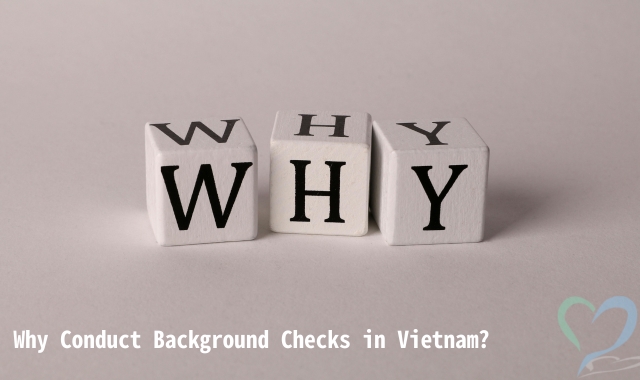Employee Background Check at Branches in Vietnam: Key Points for Risk Management
NEWS

1. Introduction

Why Background Checks Are Essential for Overseas Branches
In today’s interconnected global marketplace, companies are no longer limited by national boundaries. Many businesses—ranging from small startups to multinational conglomerates—see overseas branches as engines for growth and diversification. Yet, entering an unfamiliar market carries inherent complexities. Regulatory frameworks may differ drastically from those at home, cultural norms can influence workplace behavior, and language barriers often complicate day-to-day operations.
Amid these challenges, one of the most pressing concerns for foreign companies is effectively overseeing their local teams. For instance, managers at the head office might struggle to enforce consistent standards or detect warning signs of potential fraud if they lack on-the-ground visibility. This is precisely why Employee Background Checks are so critical when operating in foreign locales. By performing rigorous screenings, organizations can dramatically reduce the risks associated with hiring individuals who have a history of misconduct, legal infringements, or conflicts of interest.
While every nation has unique factors that inform how background checks should be conducted, Vietnam poses a particularly intriguing landscape. Its robust economic expansion, dynamic workforce, and evolving legal environment represent both opportunities and threats. For foreign businesses, the stakes are high: a single case of embezzlement or unauthorized use of company resources can inflict serious reputational and financial harm. Consequently, a well-thought-out screening process is not just a “nice-to-have” but a crucial pillar of Risk Management.
Vietnam’s Rapid Economic Growth and Increasing Foreign Investment
Vietnam has seen impressive economic growth rates for more than two decades, thanks to government policies geared toward attracting foreign direct investment (FDI), rising consumer spending power, and integration into global supply chains. Particularly in major urban centers like Ho Chi Minh City and Hanoi, state-of-the-art infrastructure and thriving commercial districts offer a glimpse of Vietnam’s ambitious future. From manufacturing to tech startups, sectors across the board are capitalizing on these favorable conditions.
However, with this boom comes intense competition for local talent. Large corporations, small businesses, and joint ventures all vie for qualified personnel—especially those with niche skills or bilingual capabilities. This fierce competition often pressures HR teams to accelerate hiring processes, potentially skipping the detailed due diligence normally associated with Employee Background Checks. Doing so can inadvertently allow candidates with questionable backgrounds to slip through, creating vulnerabilities that may not surface until it’s too late.
The Risk of Employee Misconduct in Emerging Markets
Emerging markets often exhibit distinctive cultural practices and legal structures that can inadvertently foster opportunities for misconduct. In Vietnam, the concept of “relationships first, contracts second” can be a double-edged sword. On one hand, personal connections can facilitate trust and smoother business dealings; on the other, these same connections may obscure boundary lines between business and personal interests, potentially enabling fraudulent activities.
Furthermore, labor regulations and enforcement mechanisms may differ from those in more developed economies, creating loopholes that unscrupulous employees can exploit. For instance, local managers might not receive adequate training to identify accounting anomalies, or staff may hesitate to report suspicious activities if they believe exposing wrongdoing could jeopardize their professional relationships. Against this backdrop, thorough and ongoing background checks help safeguard a company’s integrity and finances in a rapidly evolving market.
2. Why Conduct Background Checks in Vietnam?

Fast-Growing Economy Attracting Foreign Businesses
Vietnam is one of Southeast Asia’s standout economic success stories. Buoyed by a large, youthful population and strong industrial output, it has become a magnet for foreign ventures seeking new production sites, distribution channels, or consumer markets. Whether you operate in textiles, electronics, automotive parts, or digital services, the allure of cost-effectiveness and market potential in Vietnam can be hard to resist.
However, rapid growth also means that local employees—especially highly skilled ones—are in high demand. Businesses rushing to expand may onboard staff more quickly than they can effectively train or vet. Under such circumstances, Employee Background Checks become an essential measure to counterbalance the haste. By validating a candidate’s credentials, you can ensure they have the technical expertise, work ethic, and legal standing to contribute positively to your organization.
Common Risks: Bribery, Internal Fraud, Unauthorized Side Businesses
Emerging markets like Vietnam often grapple with corruption and insufficient institutional oversight. Although strides have been made to curb illegal activities, the reality remains that certain risks are more pronounced here than in jurisdictions with long-established compliance frameworks:
- Bribery: While not always overt, bribery can creep into procurement processes or regulatory approvals. Employees facing financial hardships—or simply seeking personal gain—might pay or receive illicit payments under the radar.
- Internal Fraud: Lack of robust oversight or blurred accountability can enable embezzlement, invoice manipulation, or other deceitful accounting practices.
- Unauthorized Side Businesses: Vietnam’s entrepreneurial climate encourages many locals to pursue multiple income streams. While this can reflect drive and ambition, it also paves the way for potential conflicts of interest if employees leverage company assets to build a rival venture.
Cultural and Legal Challenges in Managing Local Employees
Managing personnel in Vietnam is not merely a matter of translating employee handbooks or following universal labor standards. Cultural nuances play a decisive role in daily operations, influencing how employees respond to authority, how they view business relationships, and whether they feel comfortable speaking up about infractions.
Vietnam’s Characteristics
- Strong Emphasis on Personal Relationships (Networking Culture)
Establishing rapport and trust can be crucial for success, but it may also lead to scenarios where personal loyalties overshadow corporate ethics. - High Entrepreneurial Spirit (Many Locals Pursue Side Jobs)
A prevalent “side hustle” mentality can inadvertently result in conflicts of interest, particularly if the employee uses organizational resources for personal gain. - Hierarchical Society Where Questioning Superiors Can Be Difficult
In many Vietnamese workplaces, challenging authority is seen as disruptive or disrespectful. Consequently, minor infractions by senior staff can escalate due to a lack of internal whistleblowing.
3. What Risks You Should Watch For

Employee Fraud (Embezzlement, Bribery)
Employee fraud takes many forms but often involves the unauthorized diversion of company resources for personal benefit. In a cash-heavy environment—like retail, hospitality, or certain logistics operations—skimmed revenue might easily pass undetected if rigorous checks are not in place. Bribery, on the other hand, can erode your organization’s reputation and lead to legal repercussions if discovered, especially in industries that rely heavily on governmental approvals or licensing.
Breach of Confidentiality (Leaking Client Lists or Proprietary Data)
The modernization of Vietnam’s economy is accompanied by growing digital infrastructure, which presents its own set of risks. Employees with access to confidential information may be tempted to sell or leak client databases or proprietary data to competitors. Such breaches can tarnish your standing in the marketplace, potentially resulting in lost contracts or intellectual property disputes.
Unauthorized Resale of Company Property
Physical assets—ranging from electronic devices to raw materials—can become lucrative commodities for employees seeking extra income. If your business lacks a robust inventory management system or if oversight is lax, misappropriation becomes all too feasible. This issue is particularly relevant in sectors with valuable or easily transportable goods.
Running Competing Side Businesses Using Company Resources
Vietnam’s high entrepreneurial energy can translate into workers launching their own ventures—sometimes in the same sector. They might exploit employer-provided technologies, supplier networks, or brand reputation to get their personal projects off the ground. Even if this activity starts small, it can escalate, effectively funneling company resources into a direct competitor.
Fake Expense Claims (Especially in Sales or Procurement Roles)
Expense fraud is as old as commerce itself. Sales teams might pad travel costs, procurement staff could inflate vendor invoices, and managers might submit fictitious entertainment receipts. Though seemingly minor, these cumulative deceptions can mount into sizeable financial losses over time, especially if repeated by multiple employees.
Real Examples of Misconduct at Branches in Vietnam:
- Accounting Fraud: Over-reporting operational expenses and splitting the surplus with a complicit vendor is a form of collusion that can remain hidden if audits are infrequent.
- Embezzlement: Siphoning cash payments in industries where day-to-day transactions are often handled in cash, such as retail or logistics.
- Unauthorized Resale: Diverting computer equipment, spare parts, or even branded merchandise to unregulated local networks, often at a steep discount.
4. Key Elements of an Effective Background Check

Verifying Personal Identity, Education, and Work History
The cornerstone of any successful Employee Background Check lies in ascertaining that a candidate is who they claim to be. In Vietnam, you may encounter counterfeit identification documents or inaccurate resume details, so it pays to cross-check meticulously:
- Identity Documentation: Validate government-issued ID cards, residence registration, and passports for authenticity.
- Academic Credentials: Contact universities or training institutions to confirm degrees, transcripts, and specialized certifications. Be aware that some local institutions might not have digital records readily available, so this process may require patience and follow-up.
- Professional Experience: Speaking directly with former employers can reveal a candidate’s track record, though local customs might discourage frank criticism. Use strategic, non-leading questions to gauge an individual’s performance and reason for leaving.
Screening for Past Criminal or Civil Cases
In Vietnam, official criminal records are not always as centralized or as easily obtainable as they might be elsewhere. Therefore, gleaning accurate information may require cooperation with local authorities or legal professionals who understand how these systems work. Even a seemingly minor civil dispute could hint at a propensity for conflict or dishonesty, so it is wise to investigate lawsuits or ongoing litigations. Remember, however, to respect Vietnamese data protection rules and ensure candidates provide appropriate consent for these checks.
Monitoring Secondary Business Activities
Given Vietnam’s high rate of entrepreneurial pursuits, it’s prudent to incorporate policies that address the possibility of employees owning or managing side ventures. Such policies might include:
- Disclosure Agreements: Require employees—especially those in sensitive roles—to declare any active business interests upon hire and at regular intervals.
- Social Media Reviews: While you must remain compliant with privacy regulations, public platforms often reveal vital information about an individual’s extraneous activities or business affiliations.
- Regular Financial Oversight: Track any anomalies in expense reports, sudden unexplained wealth, or questionable supplier relationships that might signal an undisclosed enterprise.
Ensuring Compliance with Vietnam’s Labor Laws and Data Privacy Regulations
Vietnamese labor codes have undergone reforms to align more closely with international standards, emphasizing fair treatment, clear contractual terms, and data privacy. Nonetheless, enforcement can vary, and foreign companies unfamiliar with the local system may inadvertently overstep legal boundaries. To avoid legal complications:
- Consult Legal Experts: A Vietnamese attorney or compliance consultant can provide insights into the permissible scope of background checks, ensuring you do not violate privacy rules.
- Secure Candidate Consent: Always collect written authorization for any data investigation, and clearly communicate how the information will be used and protected.
- Document Your Process: Keep a detailed record of steps taken during each check. Transparent documentation can serve as evidence of good-faith efforts to comply with local laws if questions arise.
5. How a Professional Investigator Can Help

Local Expertise in Navigating the Vietnamese Business Environment
Hiring a professional investigator who is deeply familiar with Vietnam’s cultural and legal landscape can streamline your vetting process. Beyond language fluency, these experts know how to approach government offices or local institutions to gather accurate information, circumventing bureaucratic hurdles that might stymie newcomers.
Access to Private Databases and Local Intelligence Sources
Professional investigators often maintain extensive networks that grant them access to databases not publicly available or not easily navigable for outsiders. These resources may include court records, business registration documents, police files, and unofficial tip lines. Leveraging these databases can unveil hidden connections or prior legal issues that a standard check might miss.
Discreet, Legal Investigations Tailored to the Cultural Context
Vietnam’s sociocultural norms place great importance on harmonious relationships and preserving face. A skilled investigator is tactful in gathering evidence—particularly if a suspicion arises about a current employee. Moreover, they stay within the boundaries of defamation and privacy laws, ensuring that any findings can be acted upon without risking additional legal challenges or reputational damage.
Clear, Actionable Reporting and Risk Assessment
Data alone is insufficient unless it’s interpreted and contextualized. A reputable investigator does more than list findings; they assess the level of risk these findings represent to your organization. For instance, a past minor traffic offense may not merit much concern, whereas a criminal charge of fraud or repeated legal altercations signals a more substantial threat. Armed with this analysis, you can determine whether a candidate aligns with your firm’s risk tolerance and cultural expectations.
6. Conclusion

Conducting Employee Background Checks in Vietnam goes beyond simply verifying credentials—it is an integral part of a holistic Risk Management approach. Vietnam’s swift economic growth, vibrant entrepreneurial ecosystem, and intricate cultural customs create a set of challenges unlike those encountered in more established markets. By carefully screening prospective hires from the moment of the initial interview, you minimize the chances of onboarding individuals who may later engage in fraud, misappropriate resources, or compromise company secrets.
The process demands both diligence and cultural sensitivity. Documents and references should be examined thoroughly, taking into account potential local language barriers and the possibility of reticence among former employers. Exploring candidates’ civil or criminal records can be complicated by administrative hurdles but remains crucial for identifying any red flags. Meanwhile, the proliferation of side businesses means you should be prepared to revisit and monitor an employee’s interests throughout their tenure, using clearly defined policies and confidential reporting channels.
Partnering with experienced investigators can further sharpen your defenses. Their local know-how and discreet methods can uncover hidden information without triggering social or legal fallout. Coupled with transparent communication, legal compliance, and strong internal policies, these investigations form a multi-layered barrier against employee misconduct.
Ultimately, Vietnam offers vast potential for companies ready to invest in effective risk mitigation. Thorough background checks are a foundational element of that investment. They protect not just your bottom line but also your reputation, fostering a workplace culture rooted in accountability, trust, and shared commitment to ethical standards. By embracing a proactive stance on hiring diligence, you ensure that your branch in Vietnam—and by extension, your global enterprise—remains resilient and competitive in an ever-changing economic landscape.
- The Mystery of Johatsu: Japan’s Vanishing People Phenomenon
- Uncovering the Truth | Investment Investigations
- Real Estate Investigations: Safeguarding Your Investments
- Employee Background Check at Branches in Vietnam: Key Points for Risk Management
- Employee Background Check at Branches in Thailand : Key Points for Risk Management
- Finding Your Fiancée Who Disappeared After Getting Engaged Overseas